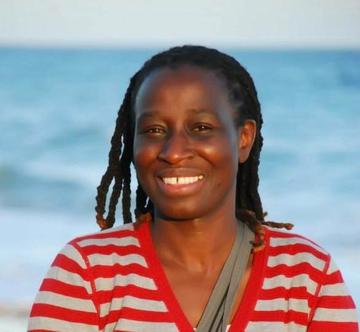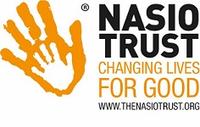Nancy Mudenyo Hunt, founder of The Nasio Trust

Nancy is an inspirational leader, who founded and leads a UK registered charity and Kenyan NGO, The Nasio Trust. Its purpose is to break the cycle of poverty through education, healthcare, food security and sustainable income generating projects. Now in its 21st year, her work in the charity has made a positive impact and changed the lives of countless children, adults and young people in Kenya and the UK. She has extensive leadership experience in the public, private and charitable sectors, managing change, innovating, and successfully setting up large-scale projects. Nancy designed and led a unique programme for young people in the UK, culminating in volunteering in Kenya. Initially focused on adolescents who had lost direction, this life-changing programme now brings together young people from all backgrounds to work together gaining experience, confidence, an awareness of wider world issues and a totally new outlook to their lives.

I was born in Kenya, the thirteenth child of an extraordinary mother, Irene, who was determined to give her children the opportunities she never had. I gained a degree in education from Egerton University, Kenya, before moving to the UK to work in the public sector in Oxford Social Services helping to tackle domestic violence and subsequently in the Thames Valley Police Service training senior police officers in leadership, equality and diversity. I set up and ran a successful training consultancy for five years with clients in the public and sectors. I decided on this because I was good at training and could see opportunities to provide an excellent service to a wide variety of clients. I used my entrepreneurial skills to found a charity to help break the cycle of poverty in my Kenyan community.
What is your definition of entrepreneurship?
Having a clear idea to meet a need and, through determination and hard work, staying focused on achieving the desired outcome despite setbacks, challenges and often the negativity of others. For 21 years since setting up the charity I have had to challenge and convince funders that small charities working at grass roots level with communities in sub-Saharan Africa can have a big impact, more so than the internationally well known charities.
How and when did you know your idea was good enough to develop it?
It first began in 2001 when my mother found an abandoned baby on her farm and there was no agency to care for him. Nobody else was doing anything in this poor rural Kenyan community to support orphaned and vulnerable children and give them hope for the future. I knew I had to take action as nobody else would. Over time as needs grew, so did my response to meeting those needs.
Since the early beginnings of providing care and a daily meal, this project has grown to provide education at purpose built day care centres, support for secondary school education, a programme for gifted vulnerable children so they can receive the quality of education appropriate to their ability, guidance on improving farming techniques for food security to combat the climate change challenges, empowering community members through support in setting up sustainable income generating projects, building a medical centre for affordable and good quality healthcare and setting up a programme for young people to learn what life is like in the wider world.
What would you say are the top 3 skills that needed to be a successful entrepreneur? Why?
To identify a real need that needs fixing – unless there is a real need for what you are doing it will fail
To communicate your vision and mission – unless you can get others to understand what your goal is and how you plan on getting there you will not get buy in or backing.
To do what you do to the highest standard, with passion and integrity – quality is essential and people must trust you as a person to deliver what is needed with your heart and soul regardless of environment or place.
What is your favourite part of being an entrepreneur?
I have met some amazing people and had incredible experiences which would not have happened if I had not embarked on this journey. I have had the privilege of making challenging decisions that affect positively the lives of so many people. It is so rewarding to know that what I have done and continue to do will benefit others.
What individual, company or organization inspires you most? Why?
Simon Sinek – starting with ‘WHY’ I always ask myself why am I doing what am doing.
My mother Irene Mudenyo’s inspiration and wisdom, believing in educating girls, because she had to leave school at the age of 13 for her brother to be educated because boys education was more important than girls. She was then married off to a chief at the age of 15. She never wanted history to repeat itself for her 9 daughters.
Wangari Mutai Maathai a Kenyan social, environmental and a political activist and the first African woman to win the Nobel Peace Prize. In 1977, well ahead of her time, she recognised the impact mankind was having on the environment and founded the Green Belt Movement planting millions of trees and protecting green spaces. She also challenged the unjust treatment of women. Being a Kenyan, in a country which is dominated by men holding most positions of authority, not because of their ability or merit, but because of their gender, I have been inspired by her personal story. Despite facing violence, discrimination and death threats she persevered with her values and beliefs, her impact reached across the globe as recognised by the Nobel Committee.
If you had 5 minutes with the above individual/ company/organization, what would you want to ask or discuss?
Wangari Maathai. I would ask how she overcame prejudice and racism during this dangerous period from the 1960s when a black woman’s voice would not be heard. She fought government and the tribal and gender injustices done to her and won. I could learn so much from her for today’s challenges which in Kenya are not so different even now.
What has been your most satisfying or successful moment in business?
The opening of our medical centre. I always knew good quality affordable healthcare was needed in the heart of this poor rural community. Despite those who said it could not be done or was not needed, I convinced enough people to raise funds and now five years later we are treating almost 20,000 patients and safely delivering 500 babies a year. Not only that the centre generates enough income for it to be sustainable. I am currently preparing a business plan and raising funds to expand our services and increase bed capacity with the aim to become a teaching hospital.
What would you say have been some of your mistakes, failures or lessons learned as an entrepreneur?
Following trends because others are saying or doing them. One example, in the early years of Nasio we were encouraged to provide people goats for breeding and milk. This was a complete failure because the community were not engaged and did not have the capacity to look after goats. This was a powerful lesson learned and nothing now happens without the community being fully engaged. Lead the change don’t follow. Nothing comes without hard work, passion and commitment
How have you funded your ideas?
By finding the right platform to speak, making a compelling case for the idea and taking others with me through getting people to place their trust in me. People can be sceptical about African charities and fear funds not going to where they are intended, so I welcome people to visit our projects to see the impact we have had on the ground. I have made sure that our processes are transparent and with good governance every penny donated is accounted for. Specific fundraisers are organising climbs of Kilimanjaro, child sponsorship, volunteering programmes, taking medical electives at our medical centre and working in partnership with charitable foundations and individuals who want to make a difference in the world.
Are there any sector-specific awards/grants/competitions that have helped you?
I was privileged to have been recognised the NatWest Venus “Most Inspirational Woman” in Oxfordshire in 2014 and in 2015 the National “Most Inspirational Woman”. In 2017 I was awarded an honorary degree of Doctor of the Open University in 2017 for Services to the educationally underprivileged. This year in December Reading University will award me an Honorary Doctorate of Letters in recognition for my leadership of The Nasio Trust.
What is good about being an entrepreneur in Oxfordshire? Bad?
The people in Oxfordshire are immensely generous and without them we could not do what we do. People help in so many ways other than just financial. Many groups knit jumpers for the little ones because although we are in Africa it can be cold at times. They also knit little hats and “Fish and Chip” tops for new born babies.
Another good thing is our partnership with Oxford University. We take micro-interns for weeklong periods throughout the year to work on projects for us. In summer we take international interns to stay at our guesthouse and undertake project work. Not only does this help us by getting ideas from very talented young people, they also have the experience of a lifetime gaining experience of a very different culture which remains with them for life.
If a new entrepreneur or startup came to you looking for entrepreneurship resources, where would you send them?
I would suggest they contacted the ROBIN Network (Responsible Oxfordshire Business Involvement Network). It is a body of like-minded, socially responsible people from businesses and public sector bodies in Oxfordshire. They will not fund ideas but they are a fantastic group of people who would be able to offer valuable guidance and support.
Have you faced any challenges as a woman entrepreneur? If so, how have you overcome them?
Being a woman of colour, I have faced numerous challenges that I have had to overcome, to really prove that I am capable and can deliver. Sadly there is prejudice, even in Oxfordshire, sometimes quite well hidden, but it exists. Fortunately, I have gained the trust of many wonderful people and organisations over the years who have believed in me and the work we do at The Nasio Trust.
What resources would you recommend for other women?
Belong to strong network of people who believe in you and your idea. Find funders who will fund your idea like “Our Common Good” , Also OCF (Oxford Community Foundation) and Sankalpa
How could institutions such as the University of Oxford better support women entrepreneurs?
Networking events and funding learning opportunities are key. The University of Oxford Careers Office has been amazingly supportive of me and the charity with internships and have extensive links with private sector organisations in Oxfordshire. There could be a regular forum to get entrepreneurs and business together for learning and making connections.
Do you have any advice specifically for other women who want to be entrepreneurs?
If you really, really believe in your idea and are prepared to sacrifice to get it just don’t give up.
Any last words of advice?
If you believe in your idea and are passionate about it, never give up. Just think of JK Rowling; what if she had given up when her Harry Potter books were rejected by 12 different publishers?
Share this
More news



